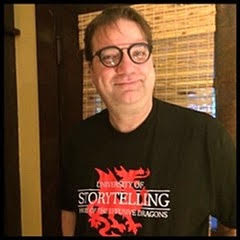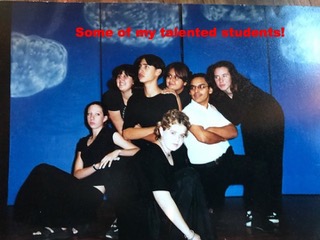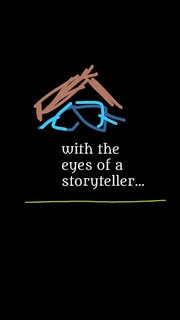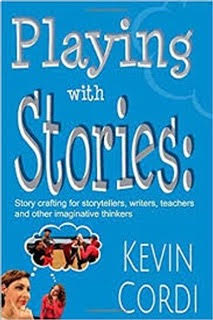By Kevin Cordi
Challenges to Those Who Respond with Story – A Call Out to Storytellers
One must continually reflect when they chose to take on the ‘mantle of storyteller’ or decide to use stories in their work and daily life. For over 25 years, I work to honor this mantle. This includes not only telling stories, but researching and reading about using narratives. I listen deeply to named and unnamed storytellers and narrative practitioners. Most of all, using story is often my first response to addressing my life and my work.
 The search for stories is unknown and invaluable.
The search for stories is unknown and invaluable.
In the interest of encouraging all of us to grow as storytellers, I share challenges that I have made and are making in this wonderful journey into narrative. I invite you to consider these challenges. The intention is to guide you knowing more about the wide circle contained in the storytelling and storytelling making process. If we widen our understanding of how story is used, we can strengthen our awareness as we build not only our comprehension but our community.
 Do not be quick to define what stories you tell. —I recently read an excellent book on telling personal narratives, but a section of the book spoke to how telling folktales and fairytales can’t reach an audience the way a personal tale can. I do believe they can have different impacts, but the importance is they have impacts. The book implied that personal narratives have more power. I don’t believe this. Storytellers often chose ‘the type of storyteller’ they want to be without ever diving into the new ways stories are being told. I would invite you to experiment with the range of stories and slowly, ever so slowly discover your direction. Perhaps you will find, like I advocate, what accomplished teller Jackie Torrence once said to me, “It is not a matter of who you are as a storyteller, but do you have the right story for this person right now.” I let this guide me as work to honor what it means to be a teller.
Do not be quick to define what stories you tell. —I recently read an excellent book on telling personal narratives, but a section of the book spoke to how telling folktales and fairytales can’t reach an audience the way a personal tale can. I do believe they can have different impacts, but the importance is they have impacts. The book implied that personal narratives have more power. I don’t believe this. Storytellers often chose ‘the type of storyteller’ they want to be without ever diving into the new ways stories are being told. I would invite you to experiment with the range of stories and slowly, ever so slowly discover your direction. Perhaps you will find, like I advocate, what accomplished teller Jackie Torrence once said to me, “It is not a matter of who you are as a storyteller, but do you have the right story for this person right now.” I let this guide me as work to honor what it means to be a teller.
 Do not be quick to define where you tell stories. People are quick to define the places they want to tell stories. I have heard, “Oh, I would never tell for teenagers, I could never get through that battle armor.” This is the wrong mindset. We often decide we won’t go to schools because when we were there (some 20, 30, or 40 years ago) and back then, it was not a place where guest artists were welcomed. We may have a bad school experience. I have news. This is not every school and much has changed since then. My friend and colleague Katie Knutson advocates telling in new places for new growth. How do you know that a bar room at an open mike night would not be a welcomed place for your work? Does your traditional mindset prevent you from this? It is because your experience as a teller is limited in the scope of telling environments. As you develop as a teller, tell at parks, bars, open mikes, libraries, retirement centers, teen gatherings, weddings, and riverboats. Holding the honor of storyteller means responding to those who need stories. Let us not restrict our experience simply because we have not been there before.
Do not be quick to define where you tell stories. People are quick to define the places they want to tell stories. I have heard, “Oh, I would never tell for teenagers, I could never get through that battle armor.” This is the wrong mindset. We often decide we won’t go to schools because when we were there (some 20, 30, or 40 years ago) and back then, it was not a place where guest artists were welcomed. We may have a bad school experience. I have news. This is not every school and much has changed since then. My friend and colleague Katie Knutson advocates telling in new places for new growth. How do you know that a bar room at an open mike night would not be a welcomed place for your work? Does your traditional mindset prevent you from this? It is because your experience as a teller is limited in the scope of telling environments. As you develop as a teller, tell at parks, bars, open mikes, libraries, retirement centers, teen gatherings, weddings, and riverboats. Holding the honor of storyteller means responding to those who need stories. Let us not restrict our experience simply because we have not been there before.
 Accept that the definition of storyteller has changed, is changing, and will continue to change. Storytellers told and tell in tents. Storytellers are consultants in business. Storytellers tell and work in hospitals. Too often I have heard that when people tell others they are storytellers, they immediately ask about dressing up and sitting in a circle telling to little kids. This is a storyteller. We should accept this. We should honor this work. However, if this is not the storyteller you are at the time, help educate others about what you do. I have found more and more people accept the diversity that is in the work of storytelling. I don’t often find resistance to my work. Perhaps it is because story is integrated in me. It is true that writers, actors, and journalists take on the name of storyteller or at least say their work is storytelling. However, we need to educate in what way our role of being a storyteller is different and our tools for storytelling accentuate that role. People have called themselves storytellers for years. This has changed over time. However, honor the mantle within the work that you do and your work will find more of the respect it deserves. (This is at least the campaign that I work to follow.)
Accept that the definition of storyteller has changed, is changing, and will continue to change. Storytellers told and tell in tents. Storytellers are consultants in business. Storytellers tell and work in hospitals. Too often I have heard that when people tell others they are storytellers, they immediately ask about dressing up and sitting in a circle telling to little kids. This is a storyteller. We should accept this. We should honor this work. However, if this is not the storyteller you are at the time, help educate others about what you do. I have found more and more people accept the diversity that is in the work of storytelling. I don’t often find resistance to my work. Perhaps it is because story is integrated in me. It is true that writers, actors, and journalists take on the name of storyteller or at least say their work is storytelling. However, we need to educate in what way our role of being a storyteller is different and our tools for storytelling accentuate that role. People have called themselves storytellers for years. This has changed over time. However, honor the mantle within the work that you do and your work will find more of the respect it deserves. (This is at least the campaign that I work to follow.)
 Storytellers should be accepted at all ages. I have had the rich pleasure of working with and helping kids and young adults engage in the telling process. I know many storytellers who see kids as listeners and not as emerging tellers. In truth, this happens less and less, but we need to be reminded that kids and teens voices need to be heard. I invite you to the National Youth Storytelling Showcase to see a sampling of quality youth telling. A video of some of the tellers is here.
Storytellers should be accepted at all ages. I have had the rich pleasure of working with and helping kids and young adults engage in the telling process. I know many storytellers who see kids as listeners and not as emerging tellers. In truth, this happens less and less, but we need to be reminded that kids and teens voices need to be heard. I invite you to the National Youth Storytelling Showcase to see a sampling of quality youth telling. A video of some of the tellers is here.
Storymaking is fundamental to the work of storytelling. For years, I spent more time working on building a performance from my work, at the expense of valuing what it took to craft the story. As storyteller, we are also story makers. We need to invest in the time to design our work from careful research, exploring multiple directions, examining perspectives, and experimenting with choices. Storymaking is integral to what we do. Spend more time on this process before moving on to telling.
One should consider, talking stories out loud before writing it down. When I started the storytelling process and I wanted to create my version of a tradition tale or recall a personal tale, I always turned to writing it down. This is the way we are trained in school, write your ideas down and when you have a workable draft, the teacher will review it. However, after serving as the Co-Director for the Columbus Area Writing Project at The Ohio State University and studying storytelling at the same university, I have learned the value of talking aloud ideas and working with both writing and talking at all stages of the storymaking process. I have also developed a new “story mediation,” with others to coach or guide the story process.
Storytellers can expand their work when they realize that telling does not have to be the outcome. Storytellers work in many circles. Stories can be used to promote inquiry. I recently used multiple perspective stories to help high schoolers think deeply about “cruel and unusual punishment.” You can read about this at https://www.tolerance.org/magazine/summer-2019/a-different-kind-of-pedagogy I have worked and see stories used to help children address how children adjust to having parents suffering from AIDS. I used stories to help guide writing practices. The outcome of this was not performance but inquiry, healing, and oral editing. Stories are used to understand business practices and community development. We can expand who we are and what we do when we extend the range of how we use stories.
 Deep listening builds better tellers. A well-known storyteller was asked how do you become a great storyteller? He replied, I tell some stories, I listen to thousands, this makes me a better teller.” There is a stark difference between hearing and listening. Listening is a practice that you must work on to improve. Walk onto a busy street and listen to the rain. Deeply concentrate on blocking everything except the teller. You have to work to hear the rain, the same is true to listening to not only the tale but the teller. The same type of listening applies to your work. Listen deeply to what you are saying and what you are not. Developing as a deep listener is a practice that builds you as a teller and as a person.
Deep listening builds better tellers. A well-known storyteller was asked how do you become a great storyteller? He replied, I tell some stories, I listen to thousands, this makes me a better teller.” There is a stark difference between hearing and listening. Listening is a practice that you must work on to improve. Walk onto a busy street and listen to the rain. Deeply concentrate on blocking everything except the teller. You have to work to hear the rain, the same is true to listening to not only the tale but the teller. The same type of listening applies to your work. Listen deeply to what you are saying and what you are not. Developing as a deep listener is a practice that builds you as a teller and as a person.
Reflection is the key to success. Educator/philosopher Parker Palmer said, “Before I can tell my life what I want to do with it, I must listen to my life telling me who I am.” However, we are often in too much of a rush to listen to what we are doing. Make space and time to revisit your practice. Reflect and revise. Reflect and honor successes. Reflect and rework when needed.
Play should be essential to the work. Play is not a ‘rehearsal for life,’ it is so much more. It is the opportunity to re-see, revisit, re-charge, re-view and re-act differently to your work as a storyteller. It is more than a “do over,” it is a time to use play, the real work of story. Give yourself permission to play with your ideas and story directions with partners and you will be amazed at your growth.

 Kevin D. Cordi, Ph.D. is a reflective and active story mediator and reflector. He believes in the inherent work of story but understands it is a practice that requires, time, effort, and company.
Kevin D. Cordi, Ph.D. is a reflective and active story mediator and reflector. He believes in the inherent work of story but understands it is a practice that requires, time, effort, and company.
He holds a Doctorate in Storytelling and Education from OSU and is the author of You Don’t Know Jack: A Storyteller Goes to School (2019, University of Mississippi Press), Playing with Stories: Story Crafting for Writers, Teachers and Other Thinkers (2016, Parkhurst Brothers) and the co-author with the talented Judy Sima of Raising Voices: Creating Youth Storytelling Groups and Troupes. Discover more at www.kevincordi.com.
“Together we make a difference with stories.”
Contact Kevin
Telephone: (559) 213-0161
Website: www.kevincordi.com
Email:
Facebook: http://www.facebook.com/kevin.cordi.professional.storyteller
Twitter: http://www.twitter.com/kevincordi
NSN loves publishing items submitted by the storytelling community! If you’re interested in writing something for publication on the NSN website, newsletter, or Storytelling Magazine please contact the NSN office for more information.
Contact the National Storytelling Network
c/o Woodneath Library
8900 N.E. Flintlock Road
Kansas City, MO 64157
Telephone: (800) 525-4514
Website: https://storynet.org
Email:
Find us on social media!
Facebook: https://www.facebook.com/National-Storytelling-Network-217381542906/
Twitter: https://twitter.com/NSNStorytellers
Instagram: https://www.instagram.com/nationalstorytellingnetwork
YouTube: https://www.youtube.com/channel/UCBedmDdaRi9N-4Hs-QeYNqw
